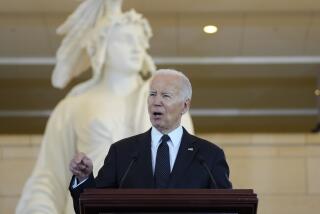Legislating the Fine Line Between Church and State
- Share via
The way Rep. Howard (Buck) McKeon tells it, he is fighting for your right to bring a Bible to work, or wear a Star of David, or bow toward Mecca, or take a break to chant nam myoho renge kyo.
And the Equal Employment Opportunity Commission, he suggests, doesn’t seem to understand the difference between a guy inviting a colleague to Sunday services and a guy suggesting a rendezvous at the nearest No-tell Motel.
Actually, I’m paraphrasing. The Republican from Santa Clarita is too much of a gentleman to put it in such bawdy terms. Instead, he states his case in House Resolution 446, urging the EEOC to remove religion from its new guidelines concerning harassment in the workplace.
To this devout Mormon, the resolution has become a mission. He’s lined up 170 co-sponsors, including 30 Democrats. He was thrilled when the Senate backed a like-minded resolution by the resounding margin of 94-0. The freshman congressman seemed to have a written a winner.
And then a few days ago, an aide showed him a “Dear Colleague” letter signed by three House Democrats and one Republican. They urged members to oppose McKeon’s resolution.
In this ambivalent land of liberty that frowns on prayer in public schools, yet still prints “In God We Trust” on its legal tender, the line that separates church and state is easily blurred. Sometimes there’s no telling where the politics of religion ends and the religion of politics begins.
McKeon and his allies, and those who oppose his resolution, agree that people should be both free from religious harassment and free to express their own religious beliefs insofar as their actions don’t infringe on the rights of others. They disagree on the means to that end.
The problem, McKeon says, is that the EEOC has now essentially expanded upon court standards used for sexual harassment that hold employers accountable for creating a “hostile environment” in the workplace. Remember, it was the fear of a “hostile environment” that prompted county officials to ban Playboy magazine from fire stations--a decision an Antelope Valley firefighter fought in court and won.
When McKeon saw the EEOC guidelines, he didn’t think of Playboy--he wondered about religious symbols. Would atheists have a case in protesting the painting on his office wall that depicts George Washington kneeling in prayer in the snows of Valley Forge?
I asked him if the thought that religious proselytizing might be considered harassment may be particularly offensive to a member of a church that emphasizes missionary work.
“I’m not looking at this as a Mormon, but I don’t know how you separate that, because that’s who I am,” McKeon said.
Religion has certainly shaped the battle lines. Early on, Rep. Howard Berman (D-Panorama City), who is Jewish, signed McKeon’s initial letter to the EEOC, but later disavowed the letter, saying his own actions were careless. Noting a history of discrimination, some Jewish groups have opposed McKeon’s resolution as a weakening of protections.
McKeon points out that Mormons have their own history of persecution and harassment.
Although he doesn’t like the label “religious right,” McKeon points out that some Christian conservatives opposed him in his first campaign.
“My opponent said I wasn’t a Christian,” he says. “I know what religious harassment means. . . . I think most Mormons do.”
McKeon insists that his resolution won’t weaken protections. Existing laws, he says, do a good job of protecting against religious discrimination and harassment.
“It’s like looking at a glass and saying it’s half empty or it’s half full,” he says.
*
McKeon must be seeing it as half full these days. Recently, the House, by a 366-37 margin, approved an amendment that for one year denies funding for the enforcement of the EEOC religious harassment guidelines. He seems optimistic that he’ll persuade a committee to hold hearings on the EEOC guidelines. And it didn’t hurt that the Washington Post, not known for its conservative editorials, recently agreed that the EEOC needed to rethink its views on religious expression.
If McKeon prevails, he’ll have overcome the fact that the controversial Rev. Louis Sheldon, leader of the Traditional Values Coalition, first alerted him to the guidelines. Sheldon is a firebrand of the Christian right. To many liberals, he’s the epitome of intolerance--and anything he’s for must be a bad idea.
But Buck McKeon doesn’t want people to think House Resolution 446 is Sheldon’s handiwork.
“If I just have a chance to talk to people . . . “ this missionary says. “If I could just make them see where I’m coming from.”
More to Read
Get the L.A. Times Politics newsletter
Deeply reported insights into legislation, politics and policy from Sacramento, Washington and beyond. In your inbox twice per week.
You may occasionally receive promotional content from the Los Angeles Times.









